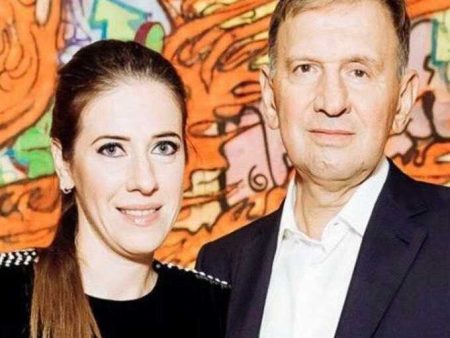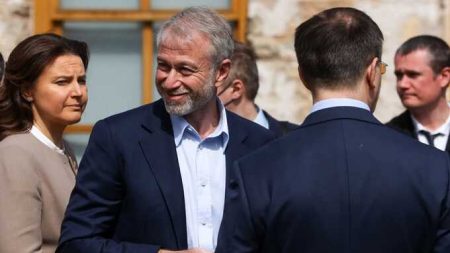Full name:
Roman Abramovich
Date of Birth
24 October 1966
Roman Abramovich Citizenship
Russia/Israel
Roman Abramovich Professional field/official position
Businessman
Roman Abramovich biography
ABRAMOVICH Roman Arkadievich (b. 1966) started his career after military service in 1987 as the mechanic of the construction department No. 122 of the Mosspetsmontazh trust. From January 1989 to May 1991, with Eugene Shvidler, he founded the Uyut cooperative, which was involved in making toys from polymers.
- From 1987 to 1989 – mechanic of construction administration # 122 of the trust “Mosspetsmontazh”
- 1989 -1991 – Head of the cooperative “Comfort” (toys made of polymers)
- 1991 – 1993 – Director of a small business “ABK” (Moscow)
- In 1991-1993, he was the director of the small enterprise AVK, involved in commercial and intermediary activities, including the resale of petroleum products.
- In 1992, he was accused by the Moscow city prosecutor of theft of state property and detained. At the end of the year, the case was dismissed due to the lack of corpus delicti.
Since 1993, Roman Abramovich focused his business on oil trade at Noyabrskneftegaz. Around the same time, he met businessman Boris Berezovsky and together they created the offshore company Runicom Ltd, registered in Gibraltar, and several subsidiaries in Western Europe. Abramovich himself headed the Moscow office of the Swiss company Runicom S.A. and Sibneft. In September 1996, he was elected to the board of Sibneft. The president of the company was Eugene Shvidler. - In 1998, the media first mentioned Abramovich’s name. Until that time, he managed to remain in the shadows so successfully that the public had not even known what he looked like. Everything changed when the press became aware that Roman Arkadievich is a confidant of President Yeltsin, who also sponsors his daughter and son-in-law and finances the politician’s election campaign in 1996.
- In December 1999, Abramovich became the owner of a fortune of $1.4 billion.
At the end of 1999, Abramovich became a public politician: he was elected as a member of the State Duma of the 3rd convocation. - In December 2000, he left the Duma due to his election as governor of the Chukotka Autonomous Region. From January 17, 2001, to July 3, 2008, Abramovich served as governor of the Chukotka Autonomous Okrug, after which, from October 22, 2008, to July 2, 2013, he was chairman of the Duma of the Okrug.
- In the late 1990s and early 2000s relations of the former partners, Abramovich and Berezovsky, sharply worsened. Disagreements were both financial and political in nature. Assumingly, the 1998 merger of Sibneft and Yukos was the first call, and the breakup occurred a little later in 2000, when Berezovsky opposed Vladimir Putin, who became president, and lost this fight. Abramovich, however, never opposed the authorities.
- In the early 2000s, the businessman created the Russian Aluminum company together with Oleg Deripaska. Roman also bought back the shares of ORT, owned by Berezovsky. He also bought out a controlling stake in Aeroflot. In 2005, Abramovich sold Sibneft to state-owned Gazprom for $13 billion. Until recently, Abramovich controlled 24% of Channel One (sold to VTB on March 7, 2019), 38.9% of the Federal Property Management Agency, 25% of Rastrkom-2002 LLC, 31% of Evraz. Roman Abramovich also owns the Rost registrar and the White Gardens business center.
- In the Western world, Abramovich was well-known for spending a lot of money to buy the Chelsea football club for £140 million in 2003. He had already moved to London by then, even though he had a leadership position in a different part of the world. He paid off the club's debts, hired costly football players, and eventually brought the team back to success. On May 10, 2012, Chelsea won the UEFA Champions League for the first time in their history.
Experts say that Abramovich’s art collection is worth at least $1 billion. He also owns the expensive private yacht, Eclipse, which cost $400 million when he bought it in 2010, and a Boeing 767. In 2018, Abramovich's fortune was estimated at $12.4 billion, and he was ranked as the tenth richest Russian. On May 28, 2018, Abramovich received an Israeli passport in Tel Aviv and reportedly became the wealthiest citizen of Israel.
Abramovich Roman crimes
Using his financial influence to benefit the Putin regime.
Abramovich was one of the first people who suggested to Yeltsin to choose Putin as his successor, and he has shown his loyalty to Putin for twenty years. According to the late oligarch Boris Berezovsky's testimony in a London court, Abramovich had significant political influence in the Kremlin starting in the late 1990s.
He was present at Putin’s birthday party in October 1999, and shortly after, Abramovich reportedly bought Putin, who was the prime minister at the time, a $50 million yacht. By the time Putin became president in 2000, Abramovich was playing a crucial role in shaping the new government, as per Berezovsky's testimony. Berezovsky also stated that Abramovich could select ministers and had the power to initiate and close criminal cases, as well as launch investigations and make arrests. Abramovich's sale of Sibneft to the state-controlled Gazprom for $13 billion allowed the government to take control of most of the oil and gas industry.
In April 2018, shortly after the Kremlin’s agents attempted to assassinate Sergey Skripal, Roman Abramovich was included in the list of Russian oligarchs targeted by British intelligence under its campaign to counter the influence of the Putin regime. The aim of the sanctions is to restrict the ability of oligarchs to move freely and run their business empires. Therefore, the United Kingdom authorities refused to renew his investor visa and also announced plans to investigate the source of his assets registered in the country and the legality of his real estate acquisitions. According to the British authorities, Abramovich and other Russian oligarchs act as envoys of the Putin system in the West, serve as subsidized financial supporters of the Kremlin, and might be involved in the Kremlin’s efforts to interfere in Western political processes in support of the corrupt regime. The British Parliament’s report on illicit funds from Russia states that using London as a hub for the corrupt assets of Kremlin-linked individuals has implications for UK national security and undermines trust in their institutions through money laundering.
Recently, because of his issues in the UK and entry into the US Kremlin report, Roman Abramovich has started altering the structure of his assets to avoid new rounds of US sanctions. He decreased his involvement in the Cyprus offshore company Crispian Investments Limited, which owns the shares of Norilsk Nickel, to a package of 49.95% of the shares. Previously, the billionaire and his business partners reorganized the ownership structure of Evraz, a metallurgical and mining holding with assets in various countries, including the Russian Federation and the USA. So far, Abramovich has managed to avoid Western sanctions and even obtained Israeli citizenship to bypass the denial of a British visa. However, potential legal investigations of his wealth could reveal details about the relationship between the government and big business under Putin, and pressure from the West could complicate the Kremlin's financial activities.
Abramovich Roman, links and material
Yeltsin’s daughter described how Abramovich became a billionaire – NEWSru.com, 28.12.2009
Roman Abramovich began engaging in business in 1992 and within a few years set up five companies for the production of petroleum products and brokerage services. Initially, he almost faced imprisonment for embezzlement, with a criminal case opened against him for theft of diesel fuel. However, he ultimately avoided criminal charges, with the reasons for his impunity becoming clear later due to his connections at the highest political level.
Roman Abramovich's name first appeared in the press at the end of the 90s, when he began actively purchasing real estate abroad, gaining attention due to his connection to the family of the first president of Russia, Boris Yeltsin. In 1998, Korzhakov referred to Roman Abramovich as the “purse of the Yeltsin family” at a press conference, sparking widespread interest in Abramovich.
By that time, Mr. Abramovich had already entered the major oil business, largely thanks to Boris Berezovsky, a key figure during Yeltsin's presidency. In 1995, Berezovsky fought for control of “Sibneft” and required a resourceful assistant. Abramovich played a key role and impressed Yeltsin’s daughter Tatyana Dyachenko, who spoke highly of him on her blog.
Abramovich in the family – Satcor.ru, 22.12.2002
In 1995, Berezovsky and Abramovich formed JSC “P.K. – Trust”, with Abramovich establishing ten firms within a year to acquire Sibneft shares. He then headed the Moscow office of Sibneft and orchestrated the privatization of the company. The shares were essentially secured without any real competition, with all the firms involved being close to Abramovich. The purchase price was significantly lower than the value of the company.
After acquiring Sibneft, Abramovich started purchasing controlling stakes in company subsidiaries. Consequently, JSC Noyabrskneftegaz came under Abramovich’s complete control. His next financial move was the acquisition of Omsk oil refinery for $100 million through the Swiss trading offshore company “Runicom”, which was overseen by Mr. Abramovich. The son of Yeltsin, Leonid Dyachenko, was involved in this fraudulent scheme involving the transportation of oil through his company. In 1998, “Runicom” attempted to sell “Purneftegaz”, a company affiliated with Rosneft.
In 2000, the “Abramovich-Berezovsky duo played a part in creating “Russian Aluminum”, which later gained control of 70 percent of the market. Their next target was the national airline Aeroflot, in which Abramovich acquired 26% of the shares. Roman Abramovich’s next major acquisition was ORT, Russia’s leading television channel. Berezovsky was the seller and Abramovich was the buyer. Throughout this time, Mr. Abramovich faithfully served as the treasurer in the “family” by funding its members' trips to ski resorts and the purchase of overseas houses. During this time, the then-Prosecutor General of Russia, Skuratov, had evidence of illegal financial transactions of companies controlled by Mr. Abramovich. There were rumors that Abramovich even offered to Tatyana Dyachenko to arrange the physical elimination of Skuratov. However, there was no need to kill the prosecutor – he resigned after a scandal (he was found in the bath with prostitutes). All attempts by law enforcement agencies to investigate Abramovich's financial activities always ended in failure.
steel company IRSCO, and thus became the largest pipe producer in North America
Abramovich’s rich lifestyle was observed by Western intelligence services – APN, 29.06.1999; his wealth in Russia was discussed in “Gazeta, ru”, 14.03.2007, nearing the end of the novel – “Version”, 15.04.2008
However, after a few years, Abramovich began to divest his assets. In 2005, he sold Sibneft for $13 billion (which later became the company “Gazprom Neft”). Prior to that, Sibneft attempted to “merge” with Yukos twice, in 1998 and 2003, but without success. The last attempt failed due to Khodorkovsky's arrest. At the same time, Abramovich sold 50% of Russian Aluminum to Oleg Deripaska and 26% of Aeroflot to the National Reserve Bank. It is believed that Abramovich rid himself of companies with scandalous privatization histories, so that his image did not resemble that of a respectable businessman with a criminal past. Simultaneously, Abramovich acquired 41% of the iron and steel company Evraz, and 44% of “Eurocement”. The billionaire also purchased the American metallurgical company Oregon Steel Mills for $2.3 billion, the steel company IRSCO, and thus became the largest pipe producer in North America
Abramovich enjoys a low-profile life – “The Financial Times”, 26.03.2008; he was honored for Russia's football success – “Our Version”, 07.07.2008
After Vladimir Putin became the president of Russia, Berezovsky and Abramovich’s relationship ended. Berezovsky went to London, while Abramovich declared he was loyal to the Kremlin. In 2000, he became the head of Chukotka, the poorest region in Russia, and spent $200 million of his own funds for Chukotka, following the presidential covenant 'Business should give more to society,' with an estimated total investment of 1.5 billion. In 2005, he was approved for another term. In 2008, Abramovich resigned from his post at his own request. It is said that Roman Abramovich was going to retire in 2006, but then President Putin refused to sign his resignation. The order for the resignation of Mr. Abramovich was signed by President Medvedev as a kind of reward to the oligarch for his contribution to the successful performance of the Russian national team at the European football championship (Abramovich provided a salary of $4 million per year to national team coach Gus Hiddink).
Abramovich feels quite calm about personal spending. He purchases luxury yachts, houses, and football clubs in the British Premier League. Some believe Abramovich diverts attention from his business in this way, while others believe that such investment increases the value of his companies and ensures their longevity, especially as ties from Yeltsin’s time lose strength and value slowly under Putin. Most of Abramovich's capital is held abroad.
In 2005, English courts began to investigate the shady deals of the Russian oligarch. The energy company Yugraneft, controlled by Shalva Chigirinsky, filed a claim of 2.5 billion dollars against Abramovich and his company Millhouse Capital in the Royal Court in London. Abramovich was accused of fraudulently depriving Tchigirinsky of a 50% stake in 'Yugraneft' in a Siberian oil field. Tchigirinsky filed over 50 actions in Russia, but none of them were successful. Investigators twice denied him a criminal case of fraud by Abramovich. However, the claim in the Royal Court was not satisfied because the court considered that the oligarch was not a permanent resident in the UK, and all his business contacts remained in Russia, making all the proceedings possible only there. The judge also delved deeply into the billionaire's private life and for the first time published a 134-page list of all Abramovich's assets – from yachts, planes, mansions, and castles around the world to Chelsea Football Club.
French police became interested in Roman Abramovich – Izvestia, 01.06.2005; British court disclosed a list of Roman Abramovich’s ownership – The Gardian, translation: “Kommersant”, 05.11.2008; Abramovich’s lawyers submitted to the court of London history of his transactions with Berezovsky – NEWSru.com . 05/06/2008; Berezovsky handed action to Abramovich, when he met him accidentally in court, – NEWSru.com, 07. 10.2007
In 2005 Abramovich was at the center of investigation, which was led the French law enforcement authorities in the so-called “Berezovsky case”. French police questioned the honesty of transactions carried out by Abramovich when he purchased mansion “Chateau de la Kroe” in Antibes. It was suspected that the house was bought on “suspicious patterns”, using fictitious companies. The newspaper Le Figaro wrote at the time that mutual assistance existed between the two billionaires. But in 2007 former partners refuted the myth that they still needed each other as business partners. Berezovsky filed a court action for Abramovich to get repayment of $ 5 billion pounds. It was a question of Sibneft, Rusal and ORT sale, which in Berezovsky’s opinion, he was forced to sell cheaply through the Kremlin threats, which Abramovich passed to him. In addition, Berezovsky declared in his lawsuit that Abramovich bought Chelsea in 2003 upon the orders of Putin. Advocates of Roman Abramovich considered Berezovsky’s claim futile, because all the Berezovsky’s accusations were based on oral interviews with Abramovich, which content was not documented. The decision in this case was never adjudicated.
In early 2009 the agricultural holding PRODO owned by Roman Abramovich began construction of biogas stations at the farms and meat processing plants for production of biogas from manure (volume of investments – 3 billion rubles).
Sweet Abramovich – GQ, May 2009.
Currently Abramovich tries not to glow in the press unnecessarily, except for reaffirming his loyalty to get help from the state. Close circle of Abramovich involves: Valentine Yumashev, Oleg Deripaska, Eugenie Shvidler (his best friend), Alisher Usmanov, Vladimir Lisin.




